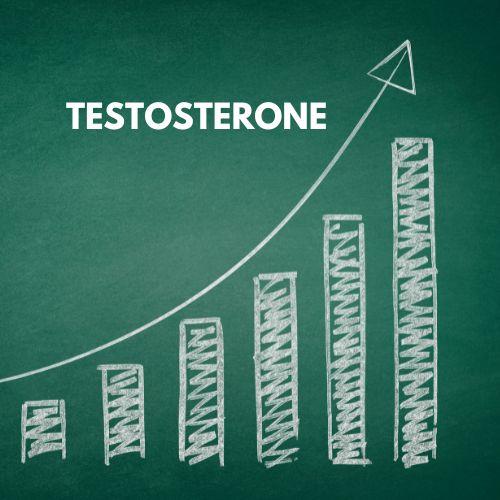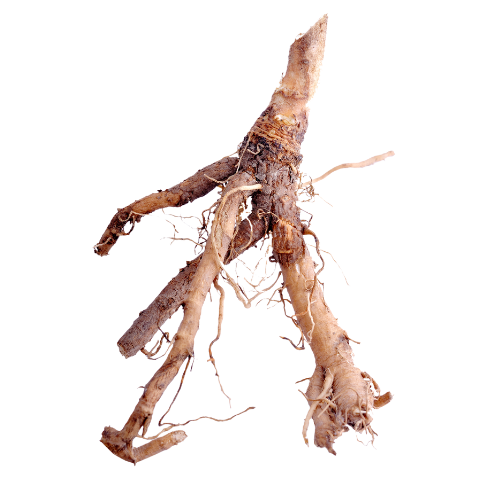Reproductive health is important for overall well-being and total health. And beyond that, overall testosterone levels can be a key indicator for myriad other health concerns. Most people are aware that testosterone is the key hormone in men responsible for bone and muscle growth, but there are risks associated with low testosterone, as well.
According to Harvard medicine, if a man has too little testosterone, he could suffer from:
Given the total-body health implications of low testosterone, but the corresponding risks cited by Harvard of too high testosterone, it is beneficial for men to find a natural, safe, and effective form of testosterone supplementation.
Key Findings
✲ Ashwagandha root has been clinically shown to improve serum levels of testosterone in healthy men.
✲ This herbal remedy has also been seen to increase dehydroepiandrosterone (DHEA), a key indicator of continued healthy testosterone levels.
✲ Other indicators (surveys of sexual health and semen levels) are also improved by Ashwagandha.
✲ No known side effects are reported by leading studies.
Ashwagandha Root and Male Health
I’ve evaluated four total studies that all looked at direct intervention with Ashwagandha root. In the first we’ll discuss, a large sample of overweight men aged 40 to 70 were given the herbal remedy for 16 weeks.
The blood test results were empirically successful: 14.7% increases in testosterone, and an 18% increase in DHEA. These numbers were statistically significant compared to any increases in the placebo group.
It is important to note, however, that there was no significant difference in the two groups as they reported feelings of fatigue or its opposite, vigor. These data tell us only one thing for sure, but could tell us two things. The first thing is that Ashwagandha, in and of itself, is not associated in this study with increased energy.
But it could also tell us a lot about the placebo effect associated with concepts like “fatigue and vigor.” In this study, it could very well be that being told this was an expected result of medication made the men feel they were experiencing that effect.
Regardless, however, the measurable data tell us that Ashwagnadha did, indeed, raise testosterone.

A Second Study
It’s always a good idea to check the scientific literature for not only corroborating evidence, but for any ancillary evidence a congruent study can offer. In this case, a study conducted after the first also found a significant increase in testosterone (16.5% with ashwagandha versus less than 2% with placebo).
Not only do these data support the other study, but the rest of this trial offers a contrasting opinion on the self-reported information. For this test, instead of asking blanket questions about “fatigue and vigor,” scientists asked participants about overall sexual health and performance based on a scientifically recognized test called the Derogatis Interview for Sexual Functioning (DISF).
Respondents in this second study reported much better results in the DISF with the Ashwagandha group. While the other study can’t be discounted, it can’t be relied upon as much as this study, given the increased rigor of the DISF. Which simultaneously means that the returned survey data for the study reporting behavioral–as well as testosterone–improvements can indicate that Ashwagandha improves these areas as well.

Other Benefits and Mechanisms
In addition to higher testosterone and some self-reported improvements in behavioral health, two studies also conclusively showed a link between Ashwagandha use and sperm counts among healthy men.
The first study was a pilot program that still managed over 40 participants, while the second study was a literature review of all other relevant data to Ashwagandha and men’s health, with a focus on sperm counts.
Both studies revealed a strong link between Ashwagandha and higher sperm counts. This correlation was strong enough to indicate causation.
Mechanism
As important as it is to know that a treatment is working is to know how it is working. In the case of Ashwagandha, scientists have not yet had the resources to determine the exact link between Ashwagnadha and increased testosterone, but each of the studies did have a theory in common: Stress.
Stress is a known cause of cortisol, the hormone released in our brains and bodies most often associated with the “fight or flight” response. What is less commonly known is that long term stress or anxiety, with concatenate long term release of and exposure to cortisol in the bloodstream, reduces the levels of other health hormones.
That is all to say that stress kills testosterone. By blocking DHEA production in the pituitary gland and testosterone production in the testes, stress not only leads to its own health problems (obesity, hypertension, high blood sugar), but also can lead to the health problems associated with low testosterone.
A multitude of studies, including many that I’ve reviewed, have conclusively shown a link between Ashwagandha use and lower stress. Not only have these studies shown a behavioral link, but have also shown decreases in cortisol.
Testosterone researchers in all the studies I’ve reviewed today make the correlation that this effect is so strong it is leading to significantly higher testosterone in men.
Conclusion
Higher testosterone should never be a health-goal in its own right. Men need to evaluate their bodies as they go through life changes to determine their own best-health goals. For men looking to have children this could mean higher sperm counts, for others it could mean keeping lean muscle mass or fighting depression.
Whatever the case, men should seek to keep their testosterone at healthy levels; not “high,” but not low, either. The present studies indicate that for these purposes, Ashwagandha root is an effective and reliable supplemental method for increase testosterone naturally, by removing the unhealthy blockages of its natural production.
